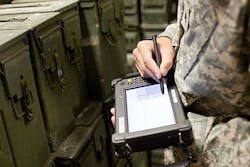Navy considers bomb-disposal applications that run on tablet computers or smart phones
INDIAN HEAD, Md., 8 April 2013. U.S. Navy researchers are surveying industry and government agencies to uncover the latest developments in mobile explosive ordnance disposal (EOD) applications that run on low-powered handheld mobile devices like tablet computers and smart phones.
The Naval Surface Warfare Center Indian Head Explosive Ordnance Disposal Technology Division in Indian Head, Md., issued a request for information last week (solicitation number: N4279413SS008) for the Joint Explosive Ordnance Disposal Decision Support System (JEOD DSS); Mobile Application Development program.
Researchers are trying to learn about known mobile bomb-disposal solutions in government and industry, recommendations of mobile EOD application development and deployment, and about what other government entities and defense contractors are doing in mobile native, Web-based, or hybrid application development for tablets and smart phones.
EOD applications today reside on stand-alone ruggedized systems that run government-designed Java based applications that provide EOD-specific data and to collect incident information while transferring data from a ruggedized laptop computer to government networks, researchers say.
Instead, Navy EOD experts are trying to find ways to shrink today's EOD systems by finding EOD software applications that run on common handheld devices like tablets and smart phones.
These next-generation mobile EOD systems would be for EOD technicians working on foot for near-real-time situational awareness, ordnance related information, and electronic data collection on site.
Navy researchers are asking those interested in participating to submit white papers no longer than 15 pages no later than 3 May 2013. Include information on the system's name and model; a picture of the system; the technology used; limitations and special requirements; capabilities; test results; data encryption certifications; performance, reliability, availability, and maintainability; hardware compatibility; and camera, operating system, navigation, and external storage.
Navy researchers are interested in programming languages; database engines; data transfer interfacing; communication devices; how application updates are handled; application security; external storage “app store” approaches; and hardware and software requirements.
For technical questions or concerns contact the Navy's Jeffrey Crownover by phone at 301-744-5285, or by email at [email protected]. For contracting questions phone Tammy Winters by phone at 301-744-6886.
More information is online at https://www.fbo.gov/spg/DON/NAVSEA/N42794/N4279413SS008/listing.html.

